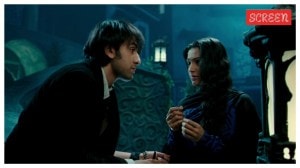Click here to follow Screen Digital on YouTube and stay updated with the latest from the world of cinema.
Express At Cannes: Jonathan Glazer’s movie on holocaust leaves viewers shaken
The Zone Of Interest, Based On A Martin Amis Novel, Transports Viewers To A Concentration Camp During WW-2
 Harrison Ford with his Honorary Palme dOr Award at Cannes on Friday. Reuters
Harrison Ford with his Honorary Palme dOr Award at Cannes on Friday. Reuters ‘The Zone Of Interest’, based on a 2014 Martin Amis novel of the same name and directed by Jonathan Glazer, is the kind of a film that is worth fighting persistent jetlag, and getting soaked, because, hey, it’s May and it is a rainy Cannes day.
The much-anticipated film, a competition entry in what is turning out to be an excellent line up, transports viewers to a time during the second World War when concentration camps were working overtime to keep up with the relentless speed of the Jewish pogrom.
Rudolf Hoss (Christian Friedel), the commander of the camp at Auschwitz, has everything under control — he makes sure that everything functions with frightening efficiency in the buildings behind the barbed wire, and his wife Hedwig ( Sandra Huller) presides over their house with a hard-edged smoothness. They have a large vegetable garden, a pool where their children gambol, and a river nearby whose placid ripples are at odds with the unbearable agony that can be felt wafting off the camp — the cries, the gunshots, and the smoke from the gas chambers.
Glazer chooses not to show us anything of the camps, and that’s wise, because then the film would be up against the legions of films which have depicted the brutalities and the horror of that time. It’s all somehow worse because all of it is happening off-screen, near enough for us to hear it, without seeing it.
As Hoss discovers that he has been given transfer orders, Frau Hoss flatly refuses to move : where else, she argues, can they find the kind of life that they have managed to create in this sylvan spot? You are hard put to decide who is more monstrous, him looking at a high-ceiling room and calculating how much gas he would need to pump in to kill those in it, or her gossiping with other Nazi wives over mid-morning coffee and cake, and yelling at the petrified Polish woman whose house they have taken over, turning her into an unpaid slave.
Both the lead performances are first-rate, and the film leaves viewers shaken. The thought came to him, Glazer said, from photos of ordinary Germans watching the misery of Jews with glee. You can see that look in lynch mobs around the world : they are everywhere.
We have been here before
The films of Nuri Bilge Ceylan demand that you surrender to his world which he creates leisurely yet surely, and reward you handsomely for your patience with unforgettable vistas and hard-to-evoke complex emotions. The Turkish auteur, whose Winter Sleep won the Palme D’Or in 2014, is back in contention for the top prize with About Dry Grasses, which could well be a spiritual extension of his previous work in the way it excavates human frailties without allowing us to sit in judgement.
School teacher Samet (Deniz Celiloglu) and a teenage pupil are seen bracketed in conversations which instantly make us wary : is the young girl a coquette, who likes to speak to her teacher in a teasingly intimate, older-than-her-years manner, or has the man been grooming her? Biding his time in this remote Anatolian hamlet, desperately waiting for a transfer to Istanbul, Samet finds himself embroiled in an uneasy mess of his own making. Will his growing attraction to his colleague Nuray ( Merve Dizdar) help him or hinder him in his pursuit of self? As the administration grapples with the fallout of a tantrum involving Samet and a couple of sassy students, the film lays out all its wares as expansively as ever. But this time around, some of those familiar Ceylan conventions of prolonged conversations that reveal a character trait, or situations that lead to a definitive point come off too familiar. We have been here before.
Meanwhile, a sea of umbrellas could be seen outside the Palais as the hordes lined up for the day’s big-ticket Hollywood entry Indian Jones and the Dial of Destiny, the last adventure of the daredevil archaeologist, played by the redoubtable Harrison Ford, now a ripe 80.
The reports are mixed but there isn’t any doubt that the 4th day of the festival was as much a mix of Hollywood glamour and European art house, which is so very Cannes.

- 01
- 02
- 03
- 04
- 05

































